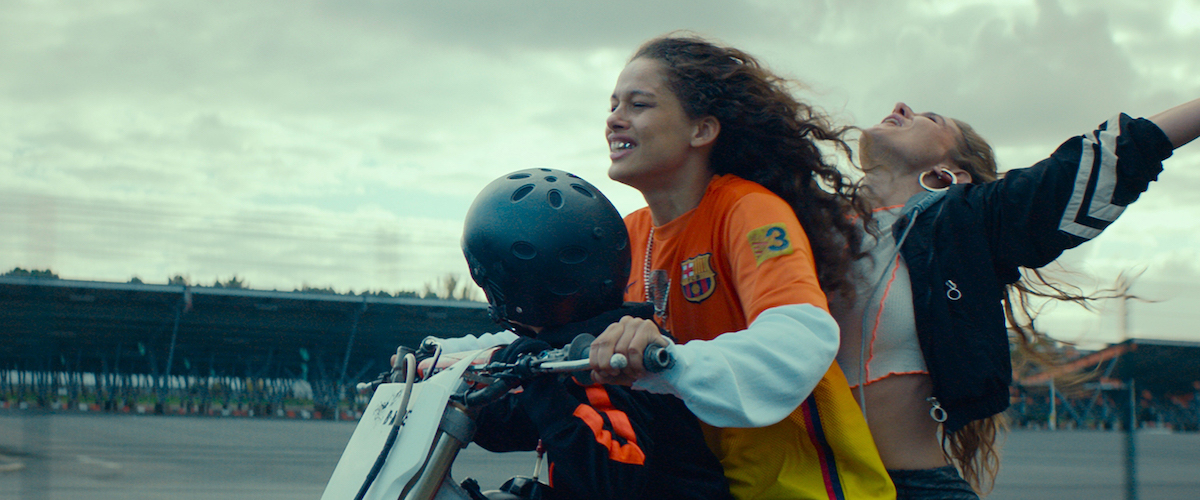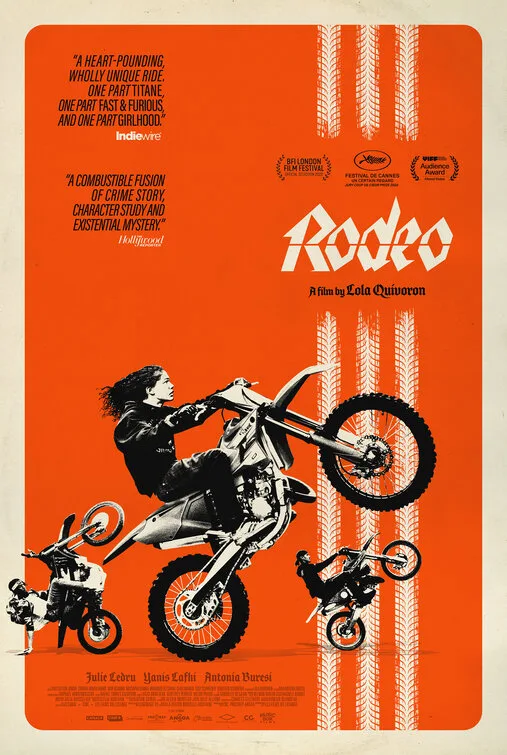Little in Julia’s life is under control. With a chaotic opening scene full of yelling and pushing in front of an unsteady camera, Lola Quivoron’s “Rodeo” paints a grim and gritty picture of a misfit biker, Julia (Julie Ledru). She wants to be a part of a community that, like her, lives to ride, but because she’s a woman and prefers to wear more motorcycle-friendly clothes than tight jeans and cute blouses, some in the all-male biker gang reject her. At her first urban rodeo, where bikers flex their skills, one rider, Abra (Dave Nsaman), shows some kindness and teaches her first trick. Sadly, the welcome is short-lived once Abra crashes. The bleak rite-of-passage of crashes and accidents ushers Julia into this unkind realm where she will make enemies like Manel (Junior Correia), few allies like Kaïs (Yannis Lafki), possibly a friend in Ophélie (Antonia Buresi), and a mysterious boss named Domino (Sébastien Schroeder) who controls the bike gang’s movement from a jail cell.
Quivoron, who co-wrote “Rodeo” with Buresi, often switches gears between character study and a heist movie, creating an uneasy whiplash. In certain scenes, the camera stays close to Julia’s world-weary eyes; her angry, defiant stare burns into whoever is unlucky enough to earn her ire. What feels like seconds later, she’s back on her bike, bidding for freedom and enjoying the wind in her long hair. But the movie occasionally loses sight of her when it focuses more on the slick dirt bikes zooming by at breakneck speeds or the gang subplot that buries Julia’s inner turmoil to the sides of the road.
The world is not kind to our movie’s heroine. Julia’s world is raw and visceral, dirty and dangerous. That hostile feeling is enhanced by Raphaël Vandenbussche’s grainy cinematography and the performances from its largely first-time actors. Nowhere feels safe for Julia, and “Rodeo” ensures that foreboding essence is felt in every tense, handheld close-up.
Ledru carries the dramatic plot with an understated but powerful presence. Her face is difficult to read, yet her body is open about her anger and drive to fight the world hellbent against her. In her feature debut, Ledru plays the role of a tough woman trying to fit in with the guys but is also vulnerable enough to connect with Ophélie and her child, who are trapped under the watchful eye of Ophélie’s commanding husband Domino. Julia and Ophélie’s dynamic deepens in the second half of the film, showing there’s more to our main character than scowls and lonely stares. She has outsized ambitions to pull off a large-scale bike heist that stands to earn a lot of money, but her reasoning is to help those also suffering under a man’s control. Julia almost always looks like she’s just dismounted her bike and removed her helmet at the bike garage, Ophélie’s home, or the street. It’s as if she were perpetually in motion, running towards an impossible future.
In some spiritual sense, Julia in “Rodeo” shares a number of similarities with Mia, the brash young protagonist in Andrea Arnold’s “Fish Tank.” Both women face violence from men, find an escape through physical expression (dirt bike urban rodeos for Julia, hip-hop dancing for Mia), and their characters feel isolated from the rest of the world that rejects them at every turn. However, “Rodeo” does not give Julia the catharsis Mia eventually reaches. Her suffering extends from one end of the picture to the other. Far from the concept of “family” from the “Fast and Furious” series, her crew sees no use for a woman other than to be kept or put to work. Quivoron’s vision is a cruel world and one that feels like it cheats its audience by the end. Maybe the real last heist was to rob us of our feelings for Julia.
Now playing in theaters.




















